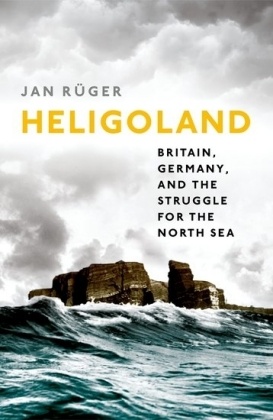Read more
Zusatztext Ruger's Heligoland: Britain, Germany, and the Struggle for the North Sea succeeds brilliantly in exposing how Britons and Germans moved from admiration to antagonism, from cooperation to conflict, intermingling elements of both during the long nineteenth century, between the world wars, and after the Second World War. Focusing on the specific, it illustrates the shifting dynamics of the general relationship. The micro-study references higher level diplomacy and the military dimensions of the Anglo-German relationship but focuses on how art, poetry, music, and the everyday interactions of islanders, visitors, and representatives of the state made Heligoland into something more than two small islands buffeted by the waves of the North Sea. Informationen zum Autor Jan Rüger is Professor of History at Birkbeck, University of London. He is the author of The Great Naval Game: Britain and Germany in the Age of Empire and joint editor of Rewriting German History. Klappentext The story of Heligoland, the North Sea island which for generations stood as a symbol of Anglo-German conflict. A fascinating microcosm of a long and often troubled relationship, covering two centuries and two world wars. Zusammenfassung On 18 April 1947, British forces set off the largest non-nuclear explosion in history. The target was a small island in the North Sea, thirty miles off the German coast, which for generations had stood as a symbol of Anglo-German conflict: Heligoland. A long tradition of rivalry was to come to an end here, in the ruins of Hitler's island fortress. Pressed as to why it was not prepared to give Heligoland back, the British government declared that the island represented everything that was wrong with the Germans: 'If any tradition was worth breaking, and if any sentiment was worth changing, then the German sentiment about Heligoland was such a one'. Drawing on a wide range of archival material, Jan Rüger explores how Britain and Germany have collided and collaborated in this North Sea enclave. For much of the nineteenth century, this was Britain's smallest colony, an inconvenient and notoriously discontented outpost at the edge of Europe. Situated at the fault line between imperial and national histories, the island became a metaphor for Anglo-German rivalry once Germany acquired it in 1890. Turned into a naval stronghold under the Kaiser and again under Hitler, it was fought over in both world wars. Heavy bombardment by the Allies reduced it to ruins, until the Royal Navy re-took it in May 1945. Returned to West Germany in 1952, it became a showpiece of reconciliation, but one that continues to bear the scars of the twentieth century.Tracing this rich history of contact and conflict from the Napoleonic Wars to the Cold War, Heligoland brings to life a fascinating microcosm of the Anglo-German relationship. For generations this cliff-bound island expressed a German will to bully and battle Britain; and it mirrored a British determination to prevent Germany from establishing hegemony on the Continent. Caught in between were the Heligolanders and those involved with them: spies and smugglers, poets and painters, sailors and soldiers. Heligoland is the compelling story of a relationship which has defined modern Europe. Inhaltsverzeichnis Prologue: Between Worlds 1: Edge of Europe 2: Nation and Empire 3: A Matter of Sentiment 4: Making Germans 5: Island Fortress 6: To Heligoland and Back 7: Disarming Germany 8: Hitler's Island 9: Out of Ruins Epilogue: No More Heligolands List of Abbreviations Notes Sources Acknowledgements Picture Credits Index ...

